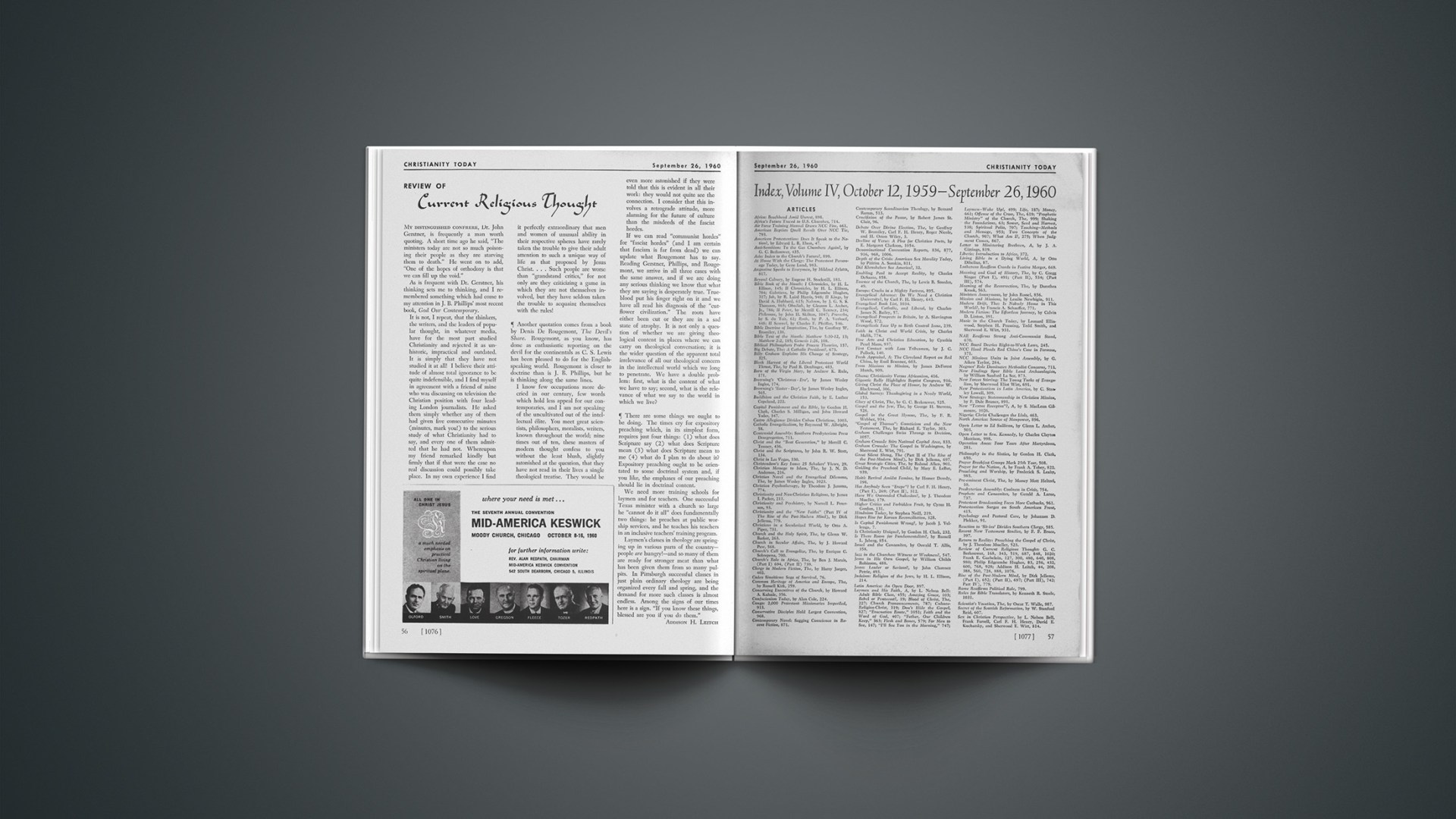My distinguished confrere, Dr. John Gerstner, is frequently a man worth quoting. A short time ago he said, “The ministers today are not so much poisoning their people as they are starving them to death.” He went on to add, “One of the hopes of orthodoxy is that we can fill up the void.”
As is frequent with Dr. Gerstner, his thinking sets me to thinking, and I remembered something which had come to my attention in J. B. Phillips’ most recent book, God Our Contemporary.
It is not, I repeat, that the thinkers, the writers, and the leaders of popular thought, in whatever media, have for the most part studied Christianity and rejected it as un-historic, impractical and outdated. It is simply that they have not studied it at all! I believe their attitude of almost total ignorance to be quite indefensible, and I find myself in agreement with a friend of mine who was discussing on television the Christian position with four leading London journalists. He asked them simply whether any of them had given five consecutive minutes (minutes, mark you!) to the serious study of what Christianity had to say, and every one of them admitted that he had not. Whereupon my friend remarked kindly but firmly that if that were the case no real discussion could possibly take place. In my own experience I find it perfectly extraordinary that men and women of unusual ability in their respective spheres have rarely taken the trouble to give their adult attention to such a unique way of life as that proposed by Jesus Christ.… Such people are worse than “grandstand critics,” for not only are they criticizing a game in which they are not themselves involved, but they have seldom taken the trouble to acquaint themselves with the rules!
Another quotation comes from a book by Denis De Rougemont, The Devil’s Share. Rougemont, as you know, has done as enthusiastic reporting on the devil for the continentals as C. S. Lewis has been pleased to do for the English-speaking world. Rougemont is closer to doctrine than is J. B. Phillips, but he is thinking along the same lines.
I know few occupations more decried in our century, few words which hold less appeal for our contemporaries, and I am not speaking of the uncultivated out of the intellectual élite. You meet great scientists, philosophers, moralists, writers, known throughout the world; nine times out of ten, these masters of modern thought confess to you without the least blush, slightly astonished at the question, that they have not read in their lives a single theological treatise. They would be even more astonished if they were told that this is evident in all their work: they would not quite see the connection. I consider that this involves a retrograde attitude, more alarming for the future of culture than the misdeeds of the fascist hordes.
If we can read “communist hordes” for “fascist hordes” (and I am certain that fascism is far from dead) we can update what Rougemont has to say. Reading Gerstner, Phillips, and Rougemont, we arrive in all three cases with the same answer, and if we are doing any serious thinking we know that what they are saying is desperately true. Trueblood put his finger right on it and we have all read his diagnosis of the “cut-flower civilization.” The roots have either been cut or they are in a sad state of atrophy. It is not only a question of whether we are giving theological content in places where we can carry on theological conversation; it is the wider question of the apparent total irrelevance of all our theological concern in the intellectual world which we long to penetrate. We have a double problem: first, what is the content of what we have to say; second, what is the relevance of what we say to the world in which we live?
There are some things we ought to be doing. The times cry for expository preaching which, in its simplest form, requires just four things: (1) what does Scripture say (2) what does Scripture mean (3) what does Scripture mean to me (4) what do I plan to do about it? Expository preaching ought to be orientated to some doctrinal system and, if you like, the emphases of our preaching should lie in doctrinal content.
We need more training schools for laymen and for teachers. One successful Texas minister with a church so large he “cannot do it all” does fundamentally two things: he preaches at public worship services, and he teaches his teachers in an inclusive teachers’ training program.
Laymen’s classes in theology are springing up in various parts of the country-people are hungry!—and so many of them are ready for stronger meat than what has been given them from so many pulpits. In Pittsburgh successful classes in just plain ordinary theology are being organized every fall and spring, and the demand for more such classes is almost endless. Among the signs of our times here is a sign. “If you know these things, blessed are you if you do them.”










